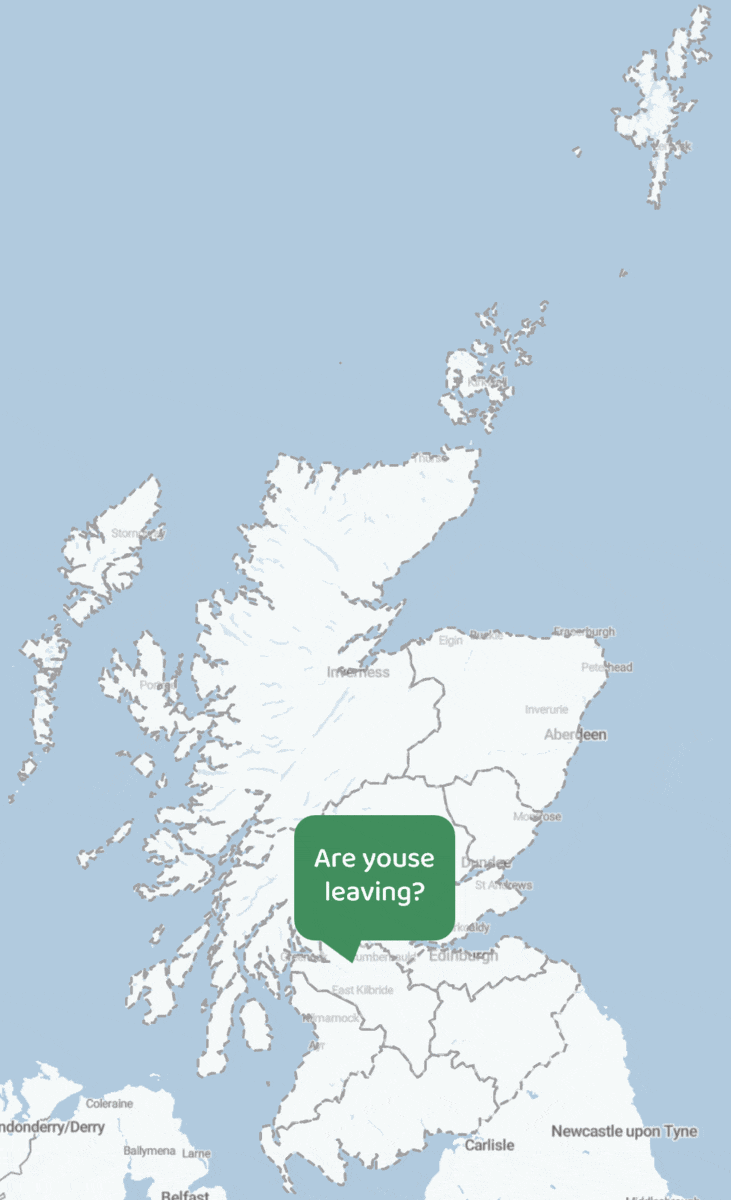More information and resources
1. Give your word: Words of Scots
Words are at the very core of language - they’re what language is made up of. At the same time, words are highly differentiated across dialects. For example, in Scots, even for something as basic as boy, we’ve got three words: loon, lad, and boy. Linguists call this lexical variation. In addition, words change very quickly from one generation to the next. The words that your granny uses are likely very different to the words you use.
1.1 Accessible resources about the words of Scots
The Scots Dictionary for Schools is a free and friendly dictionary for use in the classroom or at home. Compiled by Dictionaries of the Scots Language SCIO, the nation’s authority on Scots, the Scots Dictionary for Schools provides meanings in English for around 9,500 Scots words and phrases. It even includes audio guides for around 600 words so you can hear their pronunciation as well. Simply click on the symbol to hear the sound.
The latest version, which we highly recommend, is freely available via the app store links below.


Teachers and more advanced students may wish to consult the Dictionaries of the Scots Language at https://dsl.ac.uk. This contains all 22 volumes of A Dictionary of the Older Scottish Tongue and the Scottish National Dictionary, with supplements.
Article from the British Library on lexical variation across the UK ( https://www.bl.uk/british-accents-and-dialects/articles/lexical-variation-across-the-uk)
Spikkin Scots Quiz: How many of these Scots words and phrases do you know? from The Press and Journal (https://www.pressandjournal.co.uk/fp/pj-investigations/2654812/scottish-words-quiz/)
Scots vocabulary unit in the course Scots language and culture from The Open University ( https://www.open.edu/openlearncreate/mod/oucontent/view.php?id=143591)
Our Dialects: Lexical variation. (https://www.ourdialects.uk/lexical/) This project from the University of Manchester maps the different words people use all across the UK.
Shetland For Wirds, a site promoting Shetland dialect that includes dictionaries. (https://www.shetlanddialect.org.uk/)
1.2 Academic resources on the words of Scots
Corpus of Modern Scottish Writing (CMSW) from the University of Glasgow (Corpus of Modern Scottish Writing (CMSW) https://www.scottishcorpus.ac.uk/cmsw/)
Millar, Robert McColl. 2018. 4 Lexis. In Modern Scots: An Analytical Survey, 97-138. Edinburgh: Edinburgh University Press.
2. Sounds about right: Sounds of Scots
In Scots, there are many very distinctive pronunciations of words – doon for down, stane for stone, worum for worm, peye for pie, amongst many others. Linguists refer to this as phonological variation. Some of these are used throughout Scotland, and others are particular to specific varieties. As well as pronunciations specific to Scotland, you can also hear sounds that have been imported from elsewhere, e.g. fink for think. It’s important to note that there are rules to how we pronounce the forms in Scots, just like in any language. For example, in the North East, ball can be ba, and fall can be fa, but tall cannot be ta.
2.1 Accessible resources on the sounds of Scots
Article from The Independent about young Scots dropping their r’s (https://www.independent.co.uk/news/uk/home-news/scottish-accent-is-slowly-dying-out-as-young-scots-drop-their-r-s-say-researchers-10399661.html)
Sounds of the City, a project at the University of Glasgow looking into the speech sounds of Glasgow past and present. (https://soundsofthecity.arts.gla.ac.uk/)
Robinson, Christine. 2011. Scotspeak: A Guide to the Pronunciation of Modern Urban Scots. Luath Press Ltd.
Article from Glasgow Live about how Glaswegians pronounce the letter j (https://www.glasgowlive.co.uk/news/glasgow-news/glasgow-accent-language-dialect-fact-17196285)
Article from the British Library on phonological variation across the UK (https://www.bl.uk/british-accents-and-dialects/articles/phonological-variation-across-the-uk)
2.2 Academic resources on the sounds of Scots
Scottish Corpus of Texts & Speech (SCOTS) from the University of Glasgow (https://www.scottishcorpus.ac.uk/)
Johnston, Paul. 1997. Regional variation. In Charles Jones (ed.) The Edinburgh History of the Scots Language. Edinburgh: Edinburgh University Press. 433-513.
Accent Change in Glaswegian: A Sociophonetic Investigation project from the University of Glasgow (https://www.gla.ac.uk/schools/critical/aboutus/resources/stella/projects/accent-change-in-glaswegian/)
Is television a contributory factor in accent change in adolescents? Project from the University of Glasgow (https://www.gla.ac.uk/schools/critical/research/fundedresearchprojects/accentchange/)
3. I would never say that!: Sentence structures of Scots
This part of the resource investigates the different ways that sentences are built up from words. This part of a language is called its syntax, and it’s one of the most creative aspects of how people use language. The order of words in a language is very important: compare Dog bites man to Man bites dog. The ‘shape’ of words also gives us important meanings: compare I like that and I like those. These are all ‘rules’ that we learn unconsciously as children and all languages and dialects have such rules, whether they are standard or not. For example, we can take a simple sentence like She is here. To make this into a negative in Standard English, the rule is that we add n’t after the verb: She isn't here. In Scots, n’t can be substituted nae or na: She isnae/isna here. However, nae/na can't go everywhere that n't can! In Standard English, you can say Isn't she here?, but in Scots most speakers would find the questions Isnae she here? or Isna she here? very strange indeed. So nae and na aren't just a replacement for not or n't -- they actually have some extra, and in fact, more complicated rules as to the order of words. As well as the order of the words, the shapes of the words also have rules. In Standard English you can say those books but not those book. In the same way, in some varieties of Scots you can say they trainers, but not they trainer. Linguists have looked at thousands of different languages and dialects across the world, and ALL of them, whether standard or non-standard, written or spoken, have rules.
3.1 Accessible resources on sentence structures of Scots
Scots Syntax Atlas (https://scotssyntaxatlas.ac.uk/)
Robinson, Christine. 2012. A Modren Scots Grammar. Luath Press Ltd. You can watch an interview with the author here: https://www.scotslanguage.com/articles/node/id/525
Scots grammar unit in the course Scots language and culture from The Open University (https://www.open.edu/openlearncreate/mod/oucontent/view.php?id=147479)
Article from the British Library on grammatical variation across the UK (https://www.bl.uk/british-accents-and-dialects/articles/grammatical-variation-across-the-uk)
3.2 Academic resources on the sentence structures of Scots
Macafee, Caroline. 2011. Characteristics of non-standard grammar in Scotland. Available at: https://www.academia.edu/38768063/Characteristics_of_non_standard_grammar_in_Scotland
Purves, David. 2002. A Scots Grammar: Scots Grammar & Usage. The Saltire Society.
Millar, Robert McColl. 2018. 5 Structure: the grammar of Modern Scots. In Modern Scots: An Analytical Survey, 139-159. Edinburgh: Edinburgh University Press.
4. Where do you think this speaker is from?: Hearing regional differences in Scots
Knowing that people speak differently across Scotland is different than being able to pick out where someone is from when they talk. Studying the combinations of words, sounds, and sentences that separate the speech of one geographic area from another is called dialectology. If you’ve ever wondered why dialect quizzes are successful at guessing where you’re from, it’s because they combine the knowledge of the geographic differences in words, sounds, and sometimes sentence structures and use that to determine where someone is from.
We know that voices sound different but we often don’t think about the details of what exactly makes these voices different. The Where do you think the speaker is from activity forces you to really focus on which words, sounds, or sentence structures provide the clues as to where a speaker is from. If you enjoyed this form of ear training, there are resources below to help you explore even more voices from around Scotland.
4.1 Accessible resources on regional differences in Scots
Community voices from the Scots Syntax Atlas (https://scotssyntaxatlas.ac.uk/atlas/#6.25/57.929/-4.448/0/0/0/0/communityVoice)
Spikkin Scots interactive map of the different dialects of Scotland (https://www.pressandjournal.co.uk/fp/pj-investigations/2654848/spikkin-scots-doric/), from The Press and Journal
Scots dialect diversity unit in the course Scots language and culture from The Open University (https://www.open.edu/openlearncreate/mod/oucontent/view.php?id=143670)
The Main Dialects of Scots from the Scots Language Centre (https://www.scotslanguage.com/articles/node/id/69)
Dialect Map of Shetland from Shetland ForWirds (https://www.shetlanddialect.org.uk/dialect-map-of-shetland)
Article from The Scotsman of on the history of the Glasgow dialect (https://www.scotsman.com/whats-on/arts-and-entertainment/history-glasgow-accent-explained-1484472)
British Accents and Dialects sound recordings from the British Library (https://www.bl.uk/british-accents-and-dialects/collection-item)
Archive of BBC Voices from the British Library, which contains recorded conversations from many areas of Scotland (https://sounds.bl.uk/Accents-and-dialects/BBC-Voices)
4.2 Academic resources on regional difference in Scots
Edinburgh Speaks project from the University of Edinburgh (https://www.ed.ac.uk/ppls/linguistics-and-english-language/research/areas/language-variation-and-change/edinburgh-speaks)
Montgomery, Chris & Emma Moore. 2018. Evaluating S(c)illy voices: The effects of salience, stereotypes, and co-present language variables on real-time reactions to regional speech. Language 94(3). 629–661. https://doi.org/10.1353/lan.2018.0038.
5. She sounds really clever: Social attitudes towards speakers of Scots
The attitudes we hold toward people and places have a powerful influence on our behavior. The same is true for the attitudes we hold towards different dialects. We tend to think that a middle class speaker from Southern England must be clever, whereas a speaker from Dundee might not be. These attitudes inform how we treat speakers, although we mostly do this unconsciously. These attitudes can have serious consequences. For example, research shows that someone with a regional variety does less well in job interviews than someone who speaks Standard English. Being aware that we hold these attitudes is thus important for our understanding of accent discrimination and the effects that it might have.
5.1 Accessible resources on social attitudes towards speakers of Scots
Article from The Scotsman about accent prejudice that Scottish Islanders face (https://www.scotsman.com/news/opinion/columnists/scottish-islanders-still-face-accent-prejudice-1419400)
Results of a survey from The Press and Journal that show how Scotland feels about Scots (https://www.pressandjournal.co.uk/fp/pj-investigations/2654833/scottish-gaelic/)
Video from Darren McGarvey’s Class Wars on BBC Scotland about the social attitudes toward the Glaswegian Accent (https://www.youtube.com/watch?v=6jd7kHjsYNU)
Accent Bias Britain, Queen Mary University of London and University of York (https://accentbiasbritain.org/)
The Accentism Project, Manchester Metropolitan University (https://accentism.org/)
Accentricity podcast (https://www.accentricity-podcast.com/)
Accentricity teaching resources (https://www.accentricity-podcast.com/teaching-resources), with clips from the podcast and suggested questions and activities
Linguistic Prejudice – Variation and Change in Language: Combatting Linguistic Prejudice Through Knowledge and Understanding Project, University of Sheffield (https://preconceitolinguistico.group.shef.ac.uk/)
Vocal Fries Podcast, Carrie Gillon & Megan Figueroa (https://vocalfriespod.com)
5.2 Academic resources on social attitudes towards speakers of Scots
Leslie, Dawn. 2020. Perceptions of North East Scottish Speech. Doctoral thesis, University of Aberdeen. Available at: https://www.academia.edu/46803816/Perceptions_of_North_East_Scottish_Speech
Tichenor, Sydney. 2012. A perceptual study of Scottish dialects. MSc. dissertation, University of Edinburgh. Available at: https://era.ed.ac.uk/handle/1842/8320
Scottish Government Social Research. 2010. Public Attitudes to the Scots Language. Available at: https://d3lmsxlb5aor5x.cloudfront.net/library/document/Public-Attitudes-Towards-the-Scots-Language.pdf
6. General resource section
Scots Language Centre, promoting and supporting the Scots Language (https://www.scotslanguage.com/)
Dictionaries of the Scots Language, Scotland’s independent lexicographical body for the Scots language (https://dsl.ac.uk/)
Association for Scottish Literature, promoting the reading, writing, teaching and study of Scotland’s literatures and languages (https://asls.org.uk/)
Scots Hoose, a free online resource for children, young people and new Scots writers to inspire and support creativity in the Scots language (https://www.scotshoose.com/)
Scots Radio, a programme that speaks about the culture and the on-going plans of people who use Scots in their working world (https://www.scotsradio.com/)
Doric Film Festival, presenting the Doric Toungue on film (https://doricfilmfestival.com/)
Doric Board, an organisation which aims to enhance linguistic and cultural confidence in the North-East (https://doricboard.com/)
Scots Publishing Grant by the Scottish Book Trust, which exists to support Scottish publishers to publish and promote work written in Scots (https://www.scottishbooktrust.com/writing-and-authors/scots-language-publication-grant)

 Speak For Yersel: Scotland
Speak For Yersel: Scotland
